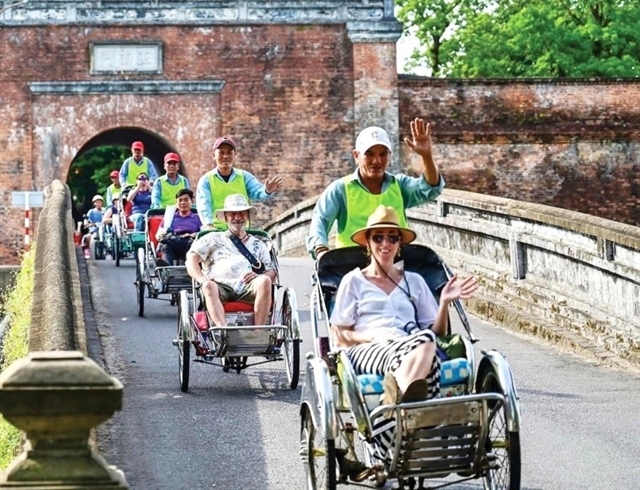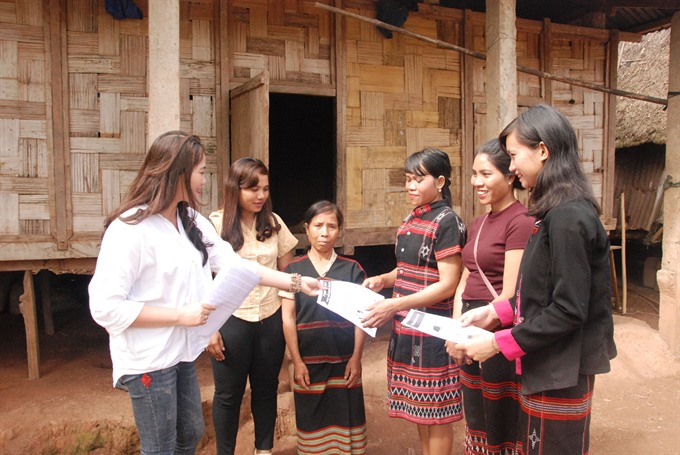 Society
Society

This was the fifth time that Hồ Thị Hợi from central Quảng Trị Province’s Đakrông mountainous district has had a baby, but the first time she has decided to not return to work.
 |
| Officers of central Quảng Trị Province’s Women’s Union visit houses in A Ngo Commune to pass on information. — VNA/VNS Photo Thanh Thuỷ |
Thanh Thủy
QUẢNG TRỊ — This was the fifth time that Hồ Thị Hợi from central Quảng Trị Province’s Đakrông mountainous district has had a baby, but the first time she has decided to not return to work.
Hợi, 35, said she used to leave her baby at home 10 days after labour to go to the field to work. As the result, her first four babies had to drink rice-water instead of being breastfed, causing them all to suffer from malnutrition.
But this time was different.
“I decided to stay at home and breastfeed my fifth baby for the first six months after birth and tried to take care of the baby scientifically to prevent malnutrition,” she said.
Hợi is among many women in A Ngo Commune in Đakrông District who have changed their habits and improved their reproductive healthcare thanks to consultancy and information from the provincial Women’s Union.
Over the past few years, mobile information sessions initiated by the Union have made an important contribution to raising awareness, change behaviour and improve the living conditions of many local women by providing them with information, knowledge and help relating to reproductive healthcare.
Being a commune bordering Laos, local women still face many difficulties in their living conditions but each information dissemination session is treated like a holiday.
Local resident Hồ Thị Diệp said: “We are very excited whenever such a meeting is held and we will try to finish our work earlier in order to attend.
“We learn new, interesting and practical knowledge from these meetings to apply to our daily lives, particularly, information relating to productive healthcare, family planning, economic development and social evil prevention.”
Đakrông and Hướng Hoá are two mountainous districts of Quảng Trị that are home to a majority of Vân Kiều and Pa Cô ethnic minority people who live in remote villages. Their living conditions still face many difficulties while their knowledge and awareness is limited, according to local authorities.
With the aim of raising local women’s awareness and eradicating backward customs, the provincial Women’s Union has coordinated with relevant agencies to organise many information activities.
These activities focus on educating and disseminating information about a wide range of issues, including legal issues, human trafficking prevention, drug prevention and control, reproductive healthcare, domestic violence and child marriage.
To improve the efficiency of these activities, officials of the provincial Women’s Union have paid home visits to provide them with essential information and knowledge.
Local women have actively took part in these meetings and established many clubs and models to support each other or to work together to fight against social evils and customs that are considered behind the times. Many clubs are highly welcomed and participated by local women such as clubs about families without crimes, women and law, legal assistance, and domestic violence prevention.
Hồ Thị Thân, head of the Women’s Union of A Đeng Hamlet in A Ngo Commune, said sessions have helped to raise awareness and improve living conditions.
“They now go to local clinic for health examination and treatment in case of illness or pregnancy instead of staying at home and applying backward customs such as making ceremonial offerings with the hope of recovery. They also know how to take care of family’s health reasonably and contribute to fight against social evils as well as participate in economic development of their own families,” she said.
As a result, issues like human trafficking, sexual abuse, illiteracy, child marriage, cousin marriage and domestic violence have been gradually reduced, according to Thân.
Chairwoman of the provincial Women’s Union Đỗ Thị Lý said these activities have brought in practical results in raising awareness and improving the living conditions of women in mountainous and border areas.
This year, the union will carry out more activities with the theme of “Safety for women in border and ethnic minority-inhabited areas,” she said. Focus will be on child marriage, social evils and “black” credits or loan sharking with the aim of helping local women to deal with their own issues. — VNS




